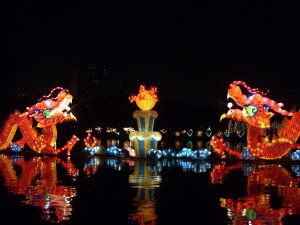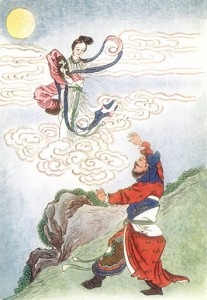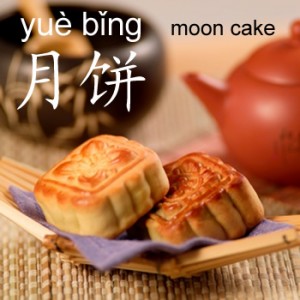中秋节 Mid-Autumn Festival
Information About the Holiday | Common Sights During the Holiday | Festive Activities | Recommended Books, CDs and DVDs
Information About the Holiday
The Mid-Autumn Festival, known as Zhōngqiūjié (say “jong chee-oh jay”) in Chinese, is also called the Moon Festival. The Festival is celebrated on the evening of the fifteenth day of the eighth lunar month. On this day, it is said that the moon appears its brightest, fullest and most beautiful. Families in China gather together at the time of the Mid-Autumn festival to gaze at the moon, honor the Moon Goddess Chang E and celebrate family togetherness.
As the Mid-Autumn Festival honors the Moon Goddess, it is traditionally the women of the household who prepare for this holiday. They clean the house, hang colorful posters of Chang E and her jade rabbit and set out candles and incense. Platters of oranges, persimmons, melons and grapes –all round like the moon– are also prepared for the evening celebration. When the moon is full, women and girls light candles, burn incense and bow to the moon in honor of the Moon Goddess and the jade rabbit. Then the whole family looks up at the moon while eating moon cakes and drinking tea.
THE TALE OF HOU YI & CHANG E
A long time ago, ten suns suddenly appeared in the sky one morning. The intense heat caused the plants and trees to wilt and die. The lakes, streams and oceans started to dry up. The people on the earth were in trouble.
Fortunately, a skilled archer named Hou Yi came to help. Hou Yi raised his magic bow toward the sky and shot down one of the ten suns. It exploded into many sparks of bright light and then disappeared. Hou Yi aimed at the next eight suns and shot them down one by one. Now only one sun remained in the sky. Once again water began to flow in the rivers and the plants slowly returned to life. The people were all very grateful to Hou Yi. A Daoist priest even rewarded Hou Yi with the pill of immortality.
Hou Yi’s beautiful wife, Chang E, was so curious that one day when Hou Yi was away, she popped the magic pill into her mouth and swallowed it. Instantly, she began to float up into the sky. Chang E floated higher and higher until she landed on the moon. On the moon, she spit out the magic pill and it turned into a jade rabbit with a green body and long pointy ears.
Common Sights During the Holiday
月饼 Moon Cakes: During the Mid-Autumn Festival, Chinese people enjoy a special pastry called yuèbǐng (say “you-eh bing”), or “moon cakes.” Moon cakes can be salty and filled with meat, vegetable or egg fillings, or they can be sweet and filled with candied fruits, nuts or red bean and lotus pastes. Moon cakes are pressed into molds before they are baked so they have a beautiful design on top. Each bakery has it’s own unique design.
Moon Cakes are not only popular in China because they taste great, they’re also a part of Chinese history. During the Yuan (say “you-en”) dynasty (1279 – 1368), China was ruled by the Mongols who had invaded from the north. The Chinese were very unhappy and wanted the Mongols to leave. Unfortunately, the Mongols watched the Chinese very closely so they couldn’t talk to each other freely. The Chinese secretly planned an attack by writing their plans on pieces of paper and hiding them inside moon cakes. They then shared the moon cakes from family to family and thus spread the attack plans to all the people.
When the day came for the attack, the Chinese were well organized and well prepared. The Mongols were taken by surprise and the Chinese won the difficult battle. The Chinese believe the use of moon cakes lead to their victory.
Festive Activities
Recite a Famous Tang Dynasty Poem: Jing Ye Si Poem by Li Bai
Eat Moon Cakes: Vinh Xuong Bakery in Denver’s Far East Center or online www.Chinasprout.com
Recommended Books, CDs and DVDs
Moon Festival by Ching Yeung Russell
The Moon Lady by Amy Tan
Chinese Children’s Favorite Stories by Mingmei Yip
Moonbeams, Dumplings & Dragon Boats by Nina Simonds




